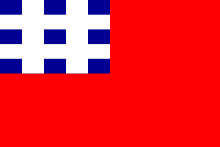|
China Zhi Gong Party
 The China Zhi Gong Party (Chinese: 中国致公党; pinyin: Zhōngguó Zhìgōngdǎng; lit. 'Public Interest Party of China') is one of the eight minor political parties in the People's Republic of China under the direction of the Chinese Communist Party. The China Zhi Gong Party was founded on 10 October 1925 in San Francisco as a party advocating for federalism and multi-party democracy. In 1926, it moved its headquarters to Hong Kong and was nearly wiped out during the Japanese occupation of the city. The party later gradually moved towards the CCP, attending the first plenary session of the Chinese People's Political Consultative Conference (CPPCC). Since the founding of the People's Republic of China, it has been a minor party under the leadership of the CCP. The party's members are mainly returned overseas Chinese and their relatives, as well as people with overseas connections. Some scholars have described the Zhi Gong Party as "gathering non-party voices to support the party". It is the sixth-ranking minor party in China. It currently has 39 seats in the National People's Congress, three seats in the NPC Standing Committee and 65 seats in the CPPCC. Its current chairman is Jiang Zuojun. History  The China Zhi Gong Party derives from the overseas Hung Society organization "Hung Society Zhigong Hall" or "Chee Kung Tong", based in San Francisco, United States. This organization was one of the key supporters of Sun Yat-sen in his revolutionary efforts to overthrow the Qing dynasty. The party was founded on 10 October 1925 in San Francisco, and was led by Chen Jiongming and Tang Jiyao, two ex-Kuomintang warlords that went into opposition. Their first platform was federalism and multi-party democracy. The party moved its headquarters to the then-British colony of Hong Kong in 1926. After the Japanese invasion of Manchuria in 1931 it began engaging in anti-Japanese propaganda and boycotts. The party was nearly wiped out during the Japanese occupation of Hong Kong. The party turned to the left during its third party congress in 1947.[1][non-primary source needed] On 21 September 1949, just before the proclamation of the People's Republic of China, representatives of the CZGP attended the first plenary Session of the CPPCC at the invitation of the CCP. They participated in drawing up the Common Program and electing the Central People's Government. As part of the CCP's reorganization of the minor aligned parties, the CZGP was designated as the party of returned overseas Chinese, their relatives, and noted figures and scholars who have overseas ties.[2] The Zhi Gong Party is sometimes used as an intermediary for contacts with certain foreign interests. For example, when a delegation of Paraguayan politicians visited Beijing in 2001 and met Li Peng (despite Paraguay having diplomatic relations not with PRC but with ROC in Taiwan), it was invited not by the PRC government or the CCP, but by the Zhi Gong Party.[3] In April 2007, Wan Gang, Deputy Chair of the Zhi Gong Party Central Committee, was appointed Ministry of Science and Technology. This was the first non-CCP ministerial appointment in China in 35 years.[4] OrganizationAccording to its constitution, the China Zhi Gong Party is officially committed to socialism with Chinese characteristics and upholding the leadership of the CCP.[5] It is the sixth-ranking minor party in China.[6] The party is a member of the Chinese People's Political Consultative Conference (CPPCC), a principal organization in the CCP's united front strategy.[2][7] The highest body of the China Zhi Gong Party officially is the National Congress, which is held every five years. The 16th National Congress, held in December 2022, was the most recently held Party Congress. The National Congress elects the Central Committee of the China Zhi Gong Party.[5] As of November 2022[update], the party has organizations in 21 province-level administrative divisions throughout China.[8] The party publishes the newspapers China Development[9] and China Zhi Gong.[10] CompositionAccording to the State Council Information Office, the China Zhi Gong Party is "mainly composed of the middle and higher ranks of returned overseas Chinese and their relatives, and representatives of people with overseas connections". In November 2022, the party had 69,000 members.[8][7] Some scholars have described the Zhi Gong Party as "gathering non-party voices to support the party".[11] Chairpersons
See alsoReferences
External linksWikimedia Commons has media related to China Zhi Gong Party. |
||||||||||||||||||||||||||||||||||||||||||||||||||||||||||||||||||||||||||||||||||||||||||||||||||||||||||||||||||||||||||||||||||||||||||||








